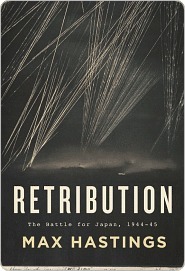More on this book
Community
Kindle Notes & Highlights
by
Max Hastings
Read between
December 8 - December 16, 2018
It was MacArthur’s good fortune that, after presiding over the initial disaster in the Philippines, he served in a theatre where American material dominance became so overwhelming that his misjudgements and follies were redeemable. The U.S. Navy achieved the decisive victories, but MacArthur was able to reap much of the glory.
Japanese atrocities might not have been directly ordered by Yamashita or Homma, but they reflected a culture of massacre in which the entire Japanese military was complicit, and which it worked assiduously for decades to promote.
Even if the generals’ executions were symbolic rather than legally proper, they were almost certainly necessary. The American decision to leave Hirohito on his throne caused many Japanese afterwards to suppose that their nation could not have behaved so very badly, if their emperor’s reign was permitted to continue. Had Japan’s most senior commanders also been judged unaccountable for the ghastly deeds of the nation’s soldiers, their survival would have appeared a betrayal of millions dead by Japanese hands.
the 1945–46 war crimes trials, in Europe as well as Asia, represented victors’ justice. No attempt was made to impose even token punishment upon Allied personnel who committed unlawful deeds. But it seemed preferable then, as it still does today, to subject to trial some of those responsible for crimes ag...
This highlight has been truncated due to consecutive passage length restrictions.
THE NEW JAPAN proved distressingly reluctant to confront the historic guilt of the old. Its spirit of denial contrasted starkly with the penitence of post-war Germany. Though successive Japanese prime ministers expressed formal regret for Japan’s wartime actions, the country refused to pay reparations to victims, or to acknowledge its record in school history texts. I embarked upon this book with a determination to view Japanese wartime conduct objectively, thrusting aside nationalistic sentiments which have clouded the perspective of many British and American writers since 1945. Japanese
...more
the alternative doctrine of moral equivalence are unconvincing, when Japanese brutality was institutionalised for many years before the Allies commenced their own excesses, if excesses they were. Even LeMay’s campaign was designed to hasten the end of the war. Many Japanese actions, by contrast, including the torture and beheading of prisoners, reflected a gratuitous pride in the infliction of suffering. Wartime Japan was responsible for almost as many deaths in Asia as was Nazi Germany in Europe. Yet only a few modern Japanese acknowledge as much, and incur the disdain or outright hostility
...more
It seems to me that dismay, indeed repugnance, should instead concentrate upon the refusal of the Japanese people, including their political, educational and corporate leaders, honestly to acknowledge their history. They still seek to excuse, and even to ennoble, the actions of their parents and grandparents, so many of whom forsook humanity in favour of a perversion of honour and an aggressive nationalism which should properly be recalled with shame. As long as such denial persists, it will remain impossible for the world to believe that Japan has come to terms with the horrors which it
...more


